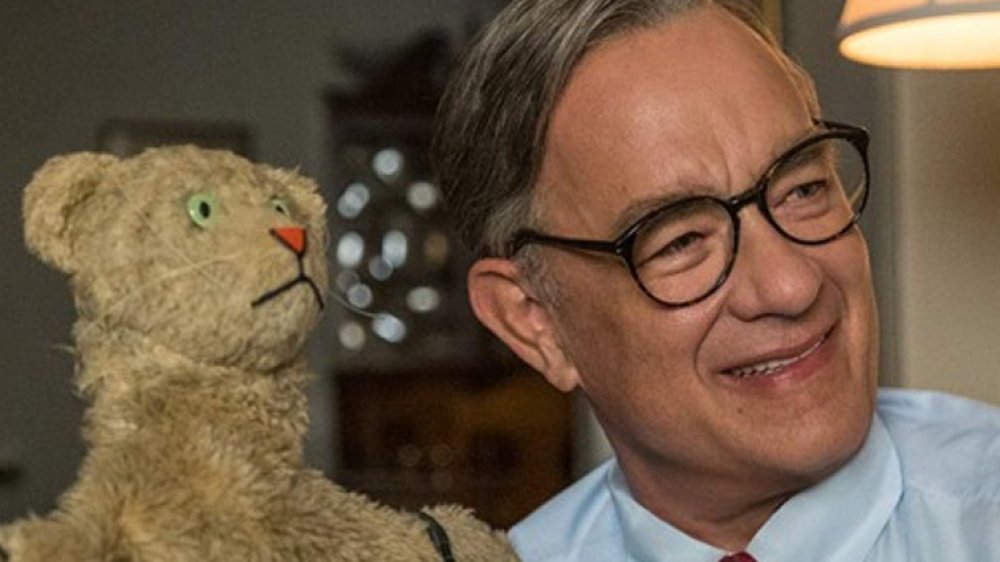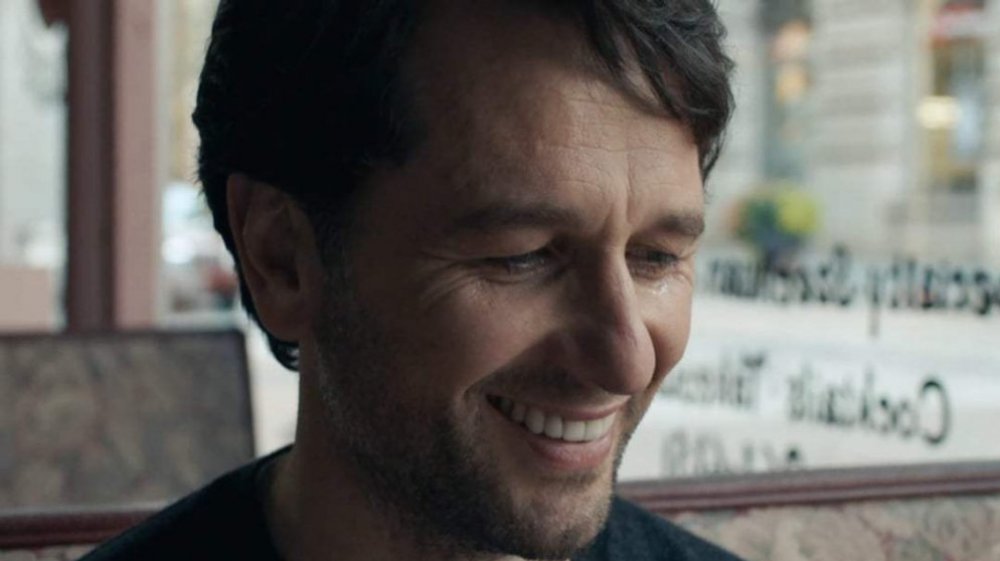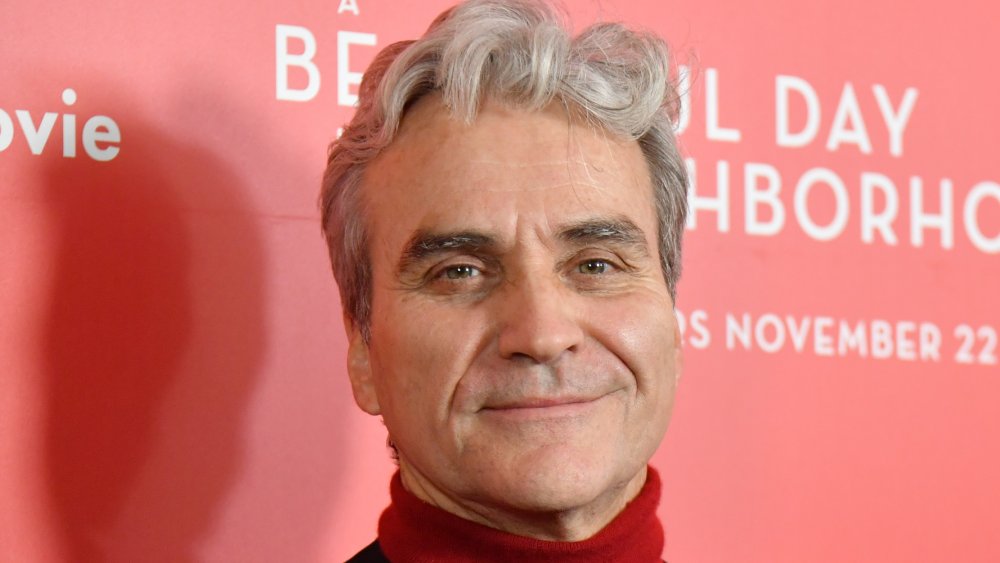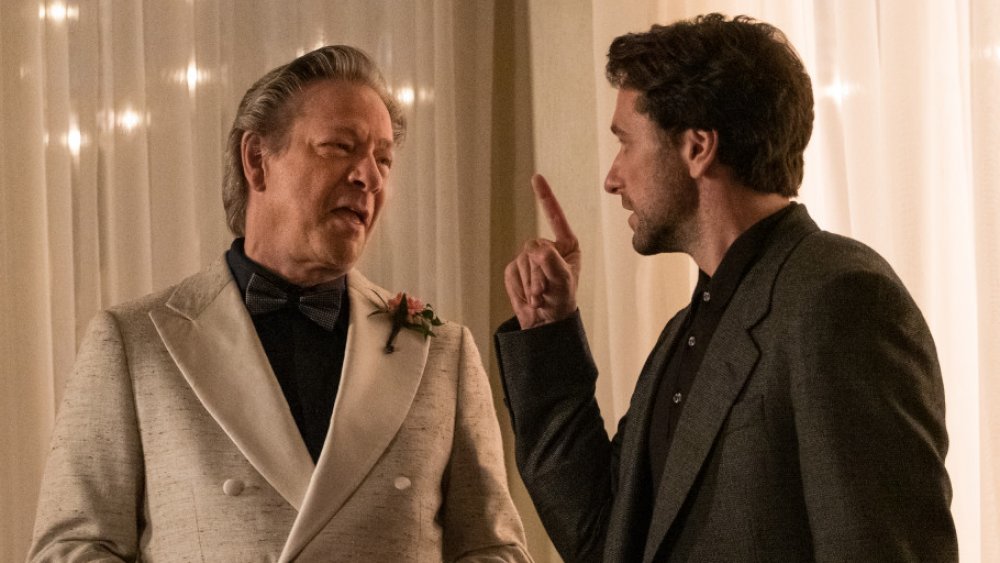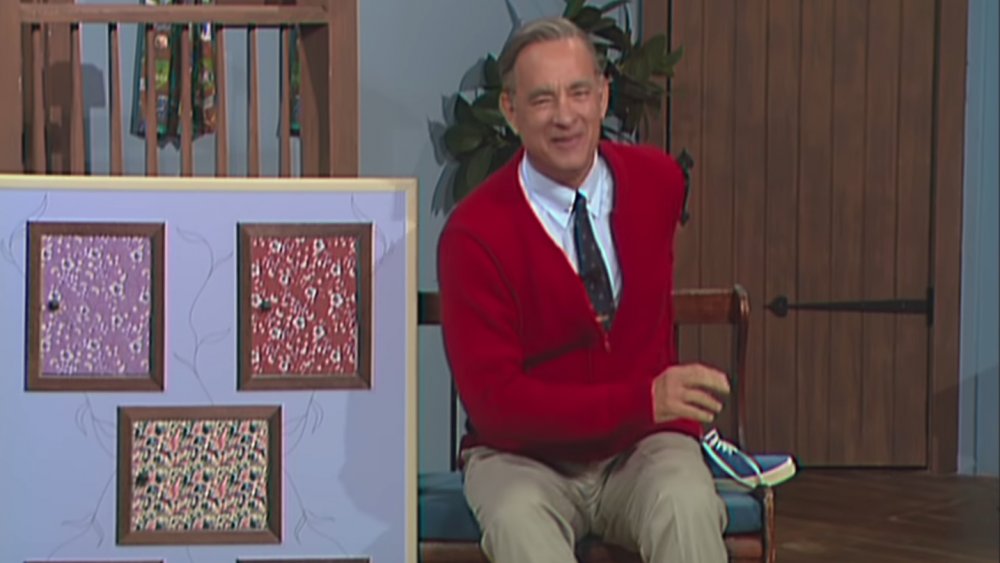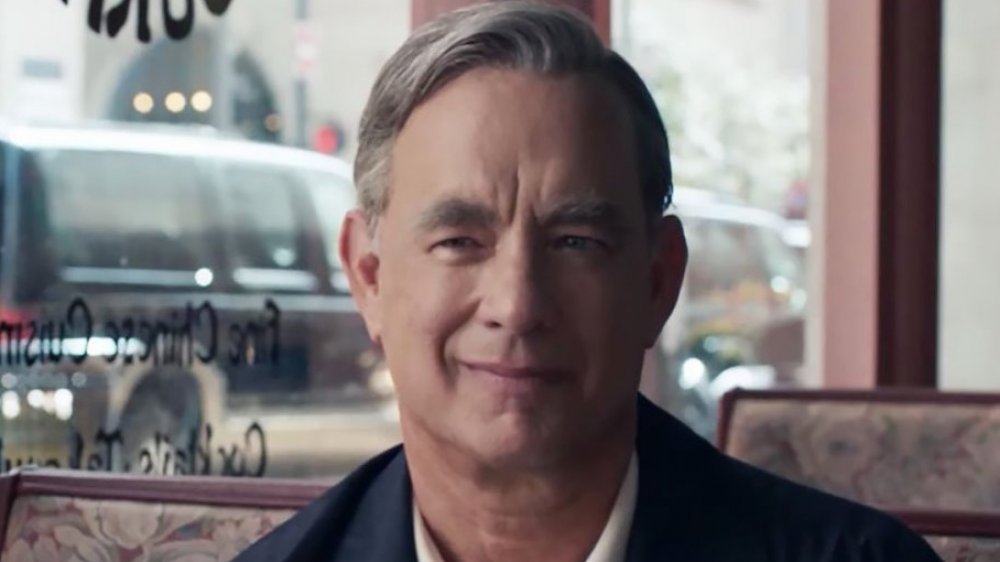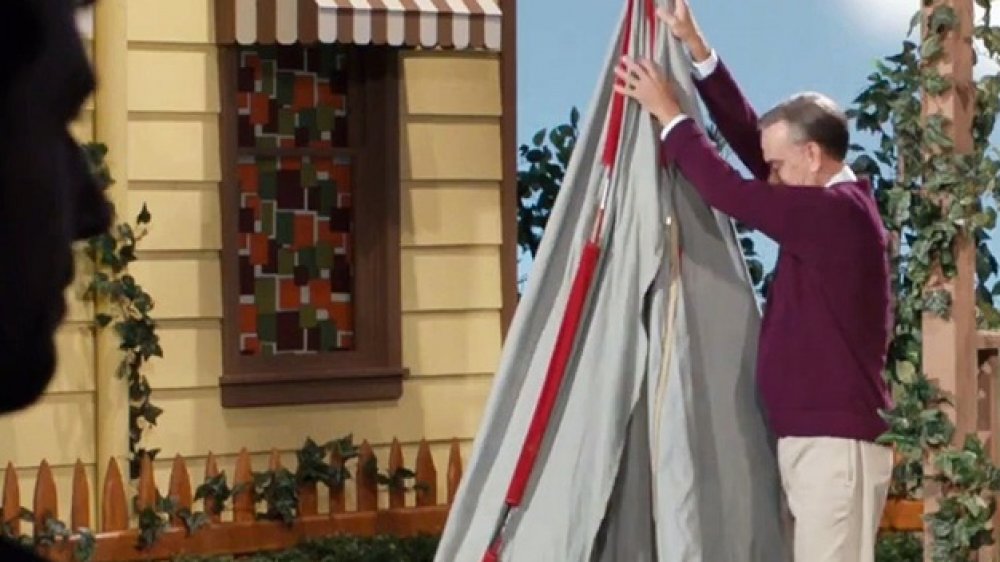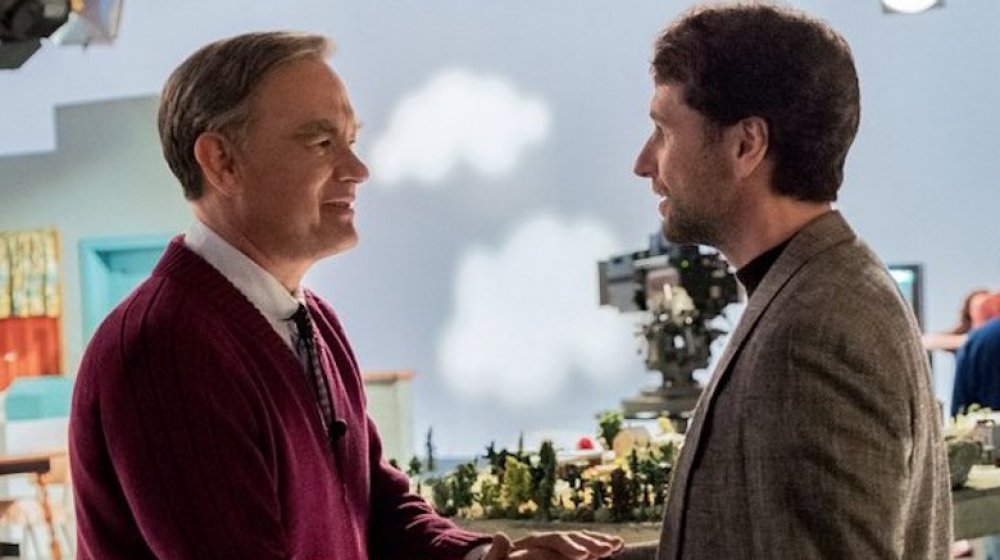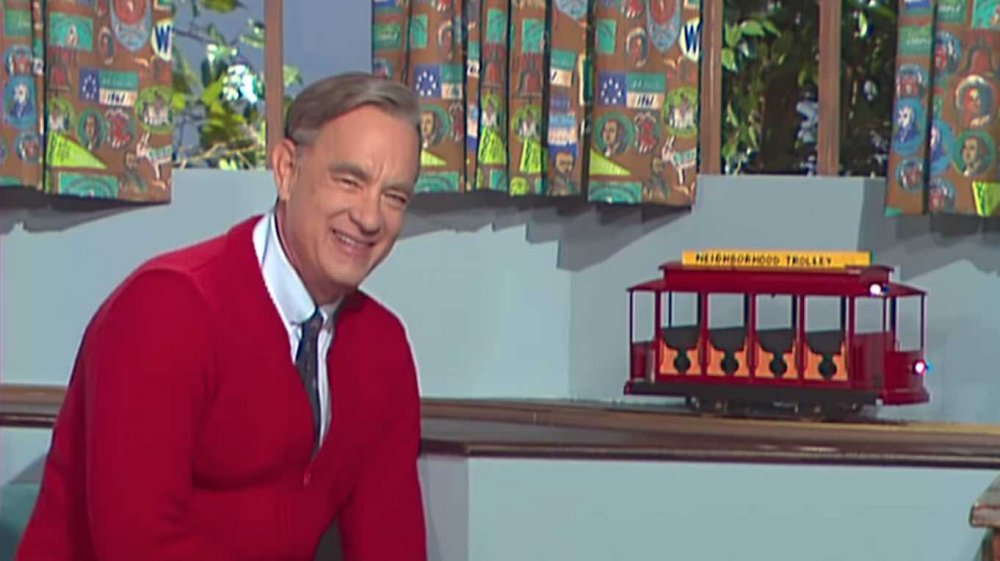All The Times A Beautiful Day In The Neighborhood Lied To You
A well-made fact-based film turns familiar names and faces into real people. A Beautiful Day in the Neighborhood is that kind of movie, exploring the life of Fred Rogers (Tom Hanks), known to generations of TV viewers as Mister Rogers, host of the long-running Mister Rogers' Neighborhood. He taught the world that's it's important to feel their emotions, but even more important to be kind to one another, and forever, unfailingly, free of any kind of selfishness or negativity.
A Beautiful Day in the Neighborhood isn't a biopic about the man so much as it is an informative meditation on how his way of life can change people, in this case an embittered writer named Lloyd Vogel (Matthew Rhys). This is a film about powerful emotions, and as such, director Marielle Heller and writers Micah Fitzerman-Blue and Noah Harpster, played fast and loose with the concrete facts behind the film. Here are some times when the Mister Rogers movie sent the exact truth on a trolley ride to the Neighborhood of Make-Believe.
Lloyd Vogel isn't a real person
Probably the biggest factual fallacy in A Beautiful Day in the Neighborhood concerns journalist Lloyd Vogel (played by Matthew Rhys). And that mistruth is that there is no such person as Lloyd Vogel. The film is based on a 1998 Esquire article called "Can You Say ... Hero?," by Tom Junod. Screenwriters exaggerated or straight-up invented so many character and story elements to make for a more dynamic screenplay that Junod asked the makers of A Beautiful Day in the Neighborhood to give the primary journalist character based on him a different name. He didn't want the public to think that a lot of the more embarrassing things that happened to his character and his family in the film actually happened to him ... because they didn't.
Additionally, Lloyd Vogel's career achievements don't quite match up with Tom's Junod's. The film primarily takes place in 1998 and shows Vogel presenting the annual National Magazine Award, an honor reserved for the previous year's winner. Junod didn't receive that prize in 1997, but he did in 1995 and 1996.
The journalist at the center of A Beautiful Day in the Neighborhood wasn't such an angry guy
Most movies tell the story of a transformation — an individual or community changed by a series of events. A Beautiful Day in the Neighborhood is no exception, detailing journalist Lloyd Vogel's journey from cynical, angry man to a kind, patient, new dad thanks to lessons learned from his interview subject, Mister Rogers.
The story is a moving one, but filmmakers exaggerated the main character's initial nastiness. Lloyd Vogel is a fictionalized version of Esquire writer Tom Junod, who wrote the article "Can You Say ... Hero?" that inspired the movie, and the two men are decidedly different. In the film, Vogel's editor assigns him a profile on Mister Rogers to challenge the writer, who is usually very tough on his subjects, to be a little softer. Junod, it would seem, was never such a dark-minded "gotcha" guy. "I was assigned the story about Fred because one of the editors at Esquire thought it would be amusing to have me, with my stated determination to 'say the unsayable,' write about the nicest man in the world," Junod wrote in The Atlantic.
The writer didn't have a baby boy
While it boasts an enchanting backdrop of Mister Rogers' Neighborhood and an attempt to understand that show's inscrutably good-hearted star, Fred Rogers, A Beautiful Day in the Neighborhood is really a movie about "daddy issues." As the film starts, journalist Lloyd Vogel has just welcomed the birth of a newborn baby boy with his wife, Andrea (Susan Kelechi Watson). Vogel bristles just a bit at being a family man, and soon viewers discover why: He hates his father because the guy cheated on Lloyd's dying mother, then abandoned the family. Lloyd has a discomfort over being the father of a son himself, which Rogers soon helps him through.
This doesn't imitate the reality of Tom Junod, the real-life guy who inspired the character. When he met Rogers, his wife, Janet, had not just given birth to a baby boy. The couple was childless, and it was Junod's conversations with Rogers that helped him believe in himself enough to fully pursue the adoption of a baby daughter.
Things weren't that strained between the journalist and his father
The main plot of A Beautiful Day in the Neighborhood involves Mister Rogers almost magically getting through to the tough, jaded, cynical reporter Lloyd Vogel so that he can forgive and reconcile with his dying father before it's too late. That dad, Jerry Vogel (portrayed by Chris Cooper) is almost entirely an invention of the cinema.
Lloyd Vogel is based on Tom Junod, and his father, Lou Junod, only resembled Jerry Vogel's character in the broadest sense. "My father, Lou Junod, was a boozy philanderer, to be sure," Junod wrote in The Atlantic. "I idolized my father, despite my mother's warnings," adding that he "never rejected him or his message." So the whole son-estranged-from-father angle of the movie just wasn't something the reporter experienced in real life. That means Tom Junod also never punched his own dad, as A Beautiful Day in the Neighborhood claims. "I did not get into a fistfight with my father at my sister's wedding," Junod wrote. "My sister didn't have a wedding."
That line about suffering was said to somebody else
One of the more powerful moments of A Beautiful Day in the Neighborhood occurs when Fred Rogers goes to visit Lloyd Vogel's father, Jerry, as the man lays dying. This is an integral moment in the movie for all three main characters — it shows the tumultuous relationship between father and son thawing, and it also demonstrates the kindness and selflessness of Mister Rogers.
While the emotional resonance may be the real, the actual reality of it is not. Rogers never visited Lou Junod on his deathbed (meaning that delicious-looking pie Mister Rogers brought along is the stuff of fantasy, too). On the other hand, there's a line from this scene that is seeded in fact. Rogers asks Jerry to pray for him, and when Jerry asks why, Rogers says, "Someone who is suffering that much must be very close to God." This is more or less what the real Rogers once told to a young boy he once met that was coping with cerebral palsy — an event that Rogers recalls to Tom Junod in the Esquire article on which this movie was based. The filmmakers just made it happen in the view of the journalist.
The moment of silence actually happened ... on TV
A Beautiful Day in the Neighborhood is really about Lloyd Vogel's arc from cynic to open-hearted man, and a major turning point in that comes when he sits in a restaurant interviewing Fred Rogers. Mister Rogers implores Lloyd to take a reflective moment of silence — 10 seconds, actually — in order "to think of the people who have loved us into being." This is a moment that Rogers made happen, and even in public, but it didn't occur in the context in which it was presented in the film.
In 1997, Rogers was presented a lifetime achievement award at the 1997 Daytime Emmy Awards. After thanking the assembled throng of TV industry professionals — most of whom had risen to their feet in thunderous applause of their beloved colleague — Rogers called for a moment of quiet. "All of us have special ones who have loved us into being. Would you just take, along with me, 10 seconds to think of the people who have helped you become who you are," Rogers asked.
The tent event happened years earlier
A Beautiful Day in the Neighborhood is not the life story of Mister Rogers. (The documentary Won't You Be My Neighbor? fills that void.) It's more about the effect of his goodness and thoughtfulness on one man ... and its target audience of adults who grew up watching Mister Rogers' Neighborhood.
One such defining Rogers moment occurs when Lloyd Vogel attends a taping of a Mister Rogers' Neighborhood episode. Rogers tries to assemble a pup tent in the yard part of his soundstage home. Try as he might, he just can't get the thing to cooperate. When asked if he wanted to try again with a new take, Rogers refused, saying that it was important to show kids watching at home that sometimes things don't go as planned — even for adults.
Mister Rogers did fail to erect a tent on the set of Mister Rogers' Neighborhood, but he did it in 1975 — more than 20 years before Tom Junod wrote the article upon which the film is based. It wasn't the craziest thing to happen on children's TV, but it probably meant a lot to kids watching.
Mister Rogers was a lot more religious than A Beautiful Day in the Neighborhood lets on
For his unwavering commitment to kindness, goodness, and devotion to children, Fred Rogers is rightly beloved and lauded — we could all stand to be a bit more like Mister Rogers, says one famous bumper sticker. He's something of a secular saint, worshiped like he's superhuman.
The film A Beautiful Day in the Neighborhood addresses this. When writer Lloyd Vogel (Matthew Rhys) comments on Rogers' saintliness, his wife, Joanne Rogers (Maryanne Plunkett), gently chides him, saying that if people think of Rogers "as a saint, then his message is unattainable." She makes a good point about considering his humanity — perhaps Mister Rogers' secret point all along — while also hinting at an aspect of Rogers life the film mostly overlooks.
Rogers was a a devoutly religious man. He was an ordained Presbyterian minister, and his Christian faith (and steadfast belief in spreading love) informed his personality, on-screen persona, and the message of his show. He was a secular saint with a secular TV show with a religious message ... and it's kind of weird the movie about him doesn't much discuss this major aspect of his character.
Mister Rogers' vegetarianism never came up with the real-life journalist
Fred Rogers was an extremely gentle man — a characteristic made obvious through Tom Hanks' portrayal in A Beautiful Day in the Neighborhood. It's also evident, through the movie and the source material (Tom Junod's 1998 Esquire article) that the TV character of Mister Rogers is one and the same with the real Fred Rogers, and he is just as gentle. How gentle was the guy? As Joanne Rogers tells Lloyd Vogel in A Beautiful Day in the Neighborhood, he was loathe to hurt even animals.
That's a true thing — the real-life Rogers adopted a vegetarian lifestyle back in the 1970s, when eschewing meat was a radical, "hippie" kind of thing to do. Yeah, Mister Rogers is more amazing than you ever knew. His quippy, affecting justification for not eating animals, as he says in the movie to Vogel, is that he refused to "eat anything that has a mother." The real Rogers was known to say this a lot when asked why he chose salad over steak, but he never said it to journalist Tom Junod (Lloyd Vogel in the movie). Or, if he did, Junod didn't quote Rogers saying it in the article — but it's such a great line, he most definitely would've found a way to include it.
